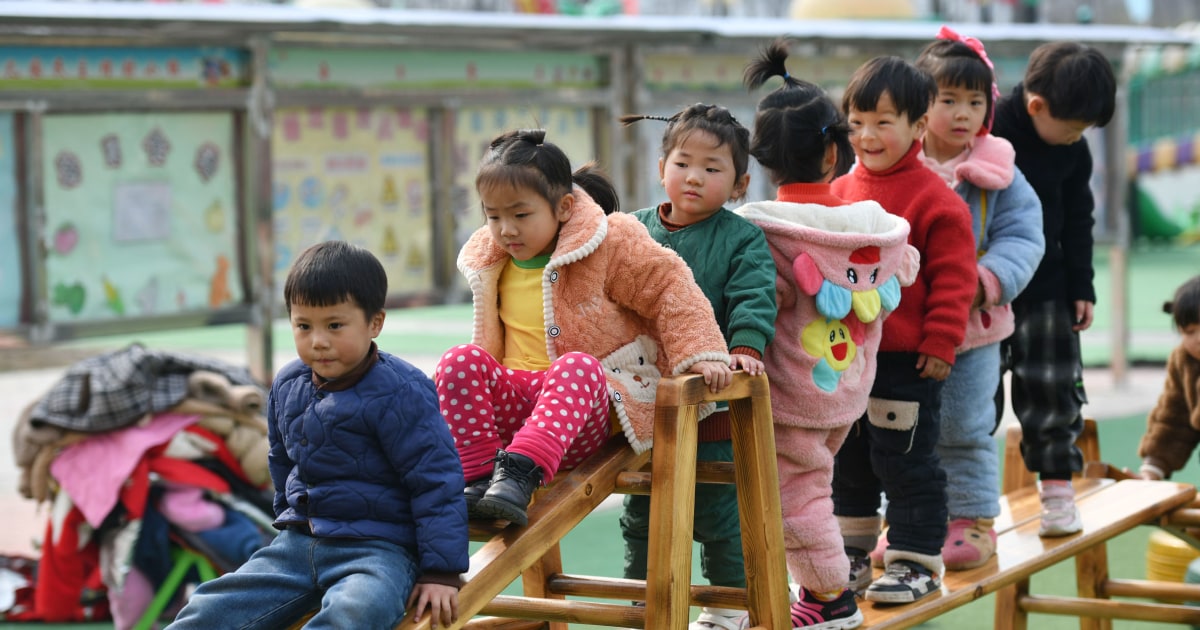The number of births in China tumbled 10% last year to hit their lowest level on record, a drop that comes despite a slew of government efforts to support parents and amid increasing alarm that the country has become demographically imbalanced.
China had just 9.56 million births in 2022, according to a report published by the National Health Commission. It was the lowest figure since records began in 1949.
The high costs of child care and education, growing unemployment and job insecurity as well as gender discrimination have all helped to deter many young couples from having more than one child or even having children at all.



This is a good thing. Almost all countries need to reduce their population. We just have way too many people on the planet and it’s stressing the system.
That’s OK, just don’t mind in working until our deaths since society won’t be able to afford any retirement system, unless for the ultra rich
Are you saying that offspring are most valued as an early retirement?
No, I’m just saying people have to work and if just a small proportion of the population is at work age, then that work age range will inevitable increase. Or do you think just 10%-20% of people working will be be able to support and supply the remaining 80% - 90%?
We can also solve this by throwing old people(when people who today are 20-40 get old probably)to the pit like that dinosaur show from the 90s ;)
Won’t the lack of a work force also give workers better barging power for pay increase and thus the ability to support their elders?
Won’t automation/robots/AI help with this? Getting rid of bullshit jobs might also be helpful.
I’m not sure. Every time I think about it, I come to a different conclusion.
For example for the animation industry, today is way faster to create an animation than 100 years ago and there is needed many less people to create a work than in the past, but this didn’t lead to a decrease in the number of people working in the industry, but rather in an massive increase in the output, So if before there were a few pieces of animation created every year, today there are a multitude more, you can see for example the Japanese animation industry the astounding number of new stuff being released every year.
What I mean is, in the current system, if you can make more with less, this does not lead to working less, but just in producing more, because companies have to continuously increasing profits forever. The working less won’t come simply in automating more, but the system itself will have to change
https://logans-run.fandom.com/wiki/Carousel
You’re dangerously wrong
https://www.theworldmind.org/home/2021/12/10/the-dangerous-myth-of-overpopulation
https://usfblogs.usfca.edu/sustainability/2023/04/20/overconsumption-not-overpopulation-debunking-the-overpopulation-myth-and-eco-fascism/
https://theecologist.org/2020/apr/16/debunking-overpopulation
https://www.vox.com/energy-and-environment/2017/9/26/16356524/the-population-question
https://www.sierraclub.org/washington/blog/2020/01/overpopulation-myth-and-its-dangerous-connotations
https://socialist.net/capitalism-and-food-hunger-amidst-plenty
Thanks for the links. Interesting reads.
Tldr, oxfam:
Around 50% of these emissions meanwhile can be attributed to the richest 10% of people around the world, who have average carbon footprints 11 times as high as the poorest half of the population.
Hard to swallow pill: The way of life of the rich countries, including the one of their poor citizens, is the problem. We, the westerners, are the problem, not the billions of China and India.
But yay electric cars and recycling… Insert “I’m doing my part” meme.
But if there are massively fewer people (say, 1 billion or less), there are ample safe spaces for them to reside without competition for resources.
Even if they pollute to current standards, the impacts are far reduced because there are far less people to impact.
Inb4 eugenicists: I’m not suggesting people should be removed, killed, or forced to do anything. This discussion suggests humanity simply decides to have far far less members.
This also ignores the growing middle class in China and India. Countries will have to be quality of life competitive or they will experience brain drain to the west.
This isn’t necessarily about the sheer size of population, and has more to do with birth rates, but this Kurzgesagt video also outlines well the need for a higher birth rate.
Here is an alternative Piped link(s):
this
Piped is a privacy-respecting open-source alternative frontend to YouTube.
I’m open-source; check me out at GitHub.
I think the problem is not overpopulation but inefficiency with the system
They are both coefficients of the same term in the equation. Resource use per population times total population. Reduce either number and the total burden on the system goes down.
So I was thinking this same thing until I watched a Kurz Gesagt video on YouTube about the effects of unbalanced populations. They pointed out that by the time our population naturally starts decreasing we’ll already be dealing with the worst consequences made worse by an aging population that cares more about maintaining the status quo than the innovation that a younger population would encourage. Grain of salt obviously… But now I’m trying to rethink how I see the issue of maintaining stability for ourselves and descendants while decreasing our strain on the system.
I don’t know where I was going with this.
It’s rather less young people than pensioners…
The system could support more people, but the world leaders are stupid, greedy, and short-sighted so currently it is a bad idea to have more people.
deleted by creator
On the contrary, actually, we need to increase our populations. Assuming that you mean an equal reduction in all demographics, the existence of productive, and hyper-productive people is mostly a game of statistics. A larger population means that more of such people will exist. Such individuals are necessary for pushing humanity forward. A nation with a larger population means a larger natural defence. A larger gloabal population decreases the chances of a mass-extinction event.
What specific stresses are you referring to? We have no lacking in resources, nor space. Economic activity is proportional to those acting within it.